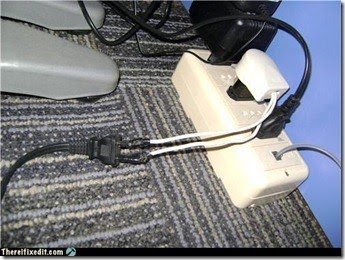In construction, electricity is part of the program. It can, however, be dangerous and even fatal if it is not handled properly. Every year hundreds of people are electrocuted in accidents involving voltages of less than 750 volts. Some of those fatalities and many painful and disabling shocks occur at 110 volts or less. We call on electricians when we have electrical problems or electrical questions. It is their job to see that the electrical system is set up properly and operating safely. It’s also their job to make any changes or repairs that may be necessary.
Whether you are an electrician or not, in the real world you frequently end up in situations where electrical safety becomes your responsibility. Let’s think about some potential electrical hazards you may find on a construction site.
Think about electric wires and junction boxes. Perhaps a wire nut is missing. Maybe an outlet is hanging out of a junction box, and the contacts are exposed. Start by presuming that all wires are energized. Don’t touch the wires or the contacts. If you have to work near them, get them covered or taped; or lockout the circuit by following the lockout/Tagout procedure. Even if you don’t have to work nearby, report the hazard to your supervisor.
If an electric tool or other piece of equipment doesn’t start properly right away, stop trying to start it. Continuing to try to start the equipment could cause damage, electrocution, or a fire. Faulty electrical tools, equipment, cords, etc., should be taken out of service and reported. A qualified electrician should make repairs.
Electrical wiring and extension cords are not for hanging clothes, tool belts, shop lights, or anything else. Watch out for extension cords; don’t run over them or pile things on them. When you move electrical equipment, don’t drag the cords behind the machine. Move the cords separately or pick them up and put them on the machine during the move.
The physical conditions in which you are working can increase electrical hazards. The risk of shock and electrocution goes up dramatically when your hands are wet or working in a wet environment. Only specially designed, explosion-proof tools should be used where flammable atmospheres exist.
Because we use electricity every day, we may begin to treat it casually. A casual attitude toward electrical safety is the starting point for accidents. Make it a habit to notice and correct electrical hazards and treat electricity with care.
SAFETY REMINDER:
You wouldn’t stick a fork into a toaster at home— treat electricity with the same respect at work.


